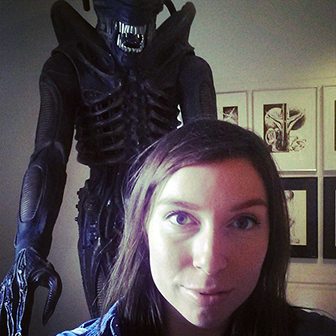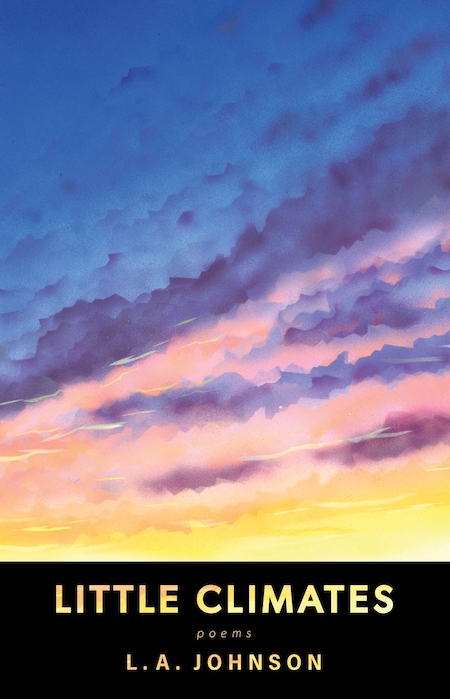
By Carole Bernstein:
PASTORAL
Sunny with the intensity of dream.
Huge balloony graffiti covered the stone
wall at the end of Avenue M,
where Iris Bloom took me to smoke a joint
and we cut Orchestra, second period.
Avenue M—was that it? some
concrete promontory, secret, above the subway
where it burst up into the light—we watched it
racket a while among the green backyards
like a real train from a real place, not Brooklyn,
and sink again.
The passengers, blinking,
would be headed for work, starting their day . . .
What possessed me that morning? I never cut school.
But we would not play that day,
our oboes lying in cases by our feet and books,
the reeds not in our mouths,
the joint passed, sipped at with the breath,
tentative, a new thing to do.
I took off my jacket, the breeze moved over my arms,
we felt lean as boys, we were
dangerous, unsexual, unobserved.
And then returned to the low building
and entered it,
blinded for a few seconds, believing
ourselves altered—the blackboard fathomless,
the passing bell shrieking.
Dull-lipped seemed the faces of the uninitiated.
By three the sun had faded, but
our smoke, its animal warmth, I thought it
scented the spring wind.
BACK TO LIFE
Daughter, delivered by an attendant:
silent and watchful in your orphanage smock
with the cartoon dog, and pilled mended pants.
A smell of mildew came from your shock
of sweaty, cropped black hair. Stuck to your chest,
in English and Chinese a name tag read
Happy Springtime: a name pressed
upon you by no father, mother. Closeted
from the world before you came to us, as if
in an ancient tomb carving of a child
rising from the grave in a flowing shift.
Freed from the humid earth, she almost smiles.
You don’t remember, but love to be told
how they brought you through the doors and you were ours.
But buried in you is that place, still. Were you cold,
solitary, left wanting, maybe for hours…
Don’t go there, I tell myself. Instead,
I grab you and inhale your fragrant head.
Today’s poems appear here today with permission from the poet.
Carole Bernstein’s second poetry collection Buried Alive: A To-Do List is forthcoming in Spring 2019 from Hanging Loose Press. She is also the author of Familiar (Hanging Loose Press)—which J. D. McClatchy called “an exhilarating book”—and a chapbook, And Stepped Away from the Circle (Sow’s Ear Press). Her poems have appeared in magazines including Antioch Review, Bridges, Button Jar, Chelsea, Light, Paterson Literary Review, Poetry, Shenandoah, and Yale Review. Her work has also been included in three anthologies: American Poetry: The Next Generation (Carnegie Mellon University Press), Unsettling America (Viking) and The Laurel Hill Poetry Anthology (Laurel Hill Press). She lives in Philadelphia and works as a freelance writer and marketing consultant.
Guest Editor’s Note: Carole Bernstein’s work carries an honest and relaxed tone, even as she addresses sensitive and intimate personal experiences. Reading her work is like being invited into her world as a close confidante, if just for a few moments. In “Pastoral,” Bernstein describes the newfound and sensual freedom that came from cutting class years ago in high school, allowing her and a friend to be “lean as boys” and feel “dangerous, unsexual, unobserved.” She resists romantic or sentimental treatment of the most personal and sentimental moments of life. In “Back to Life,” she presents, with unadorned comfort, the immediate love for a new daughter that was accompanied by “A smell of mildew came from your shock / of sweaty, cropped black hair.” Both of these poems are part of a new collection of work, Buried Alive: A To-Do List, forthcoming Spring 2019.
Want to read more by and about Carole Bernstein?
Buy Familiar on Amazon
Poetry Foundation
Hanging Loose Press

Guest Editor Alan Toltzis is the author of The Last Commandment. Recent work has appeared in print and online publications including Hummingbird, Right Hand Pointing, IthacaLit, r.k.v.r.y. Quarterly, and Cold Noon. Find him online at alantoltzis.com.
A NOTE FROM THE MANAGING EDITOR:
After nearly ten years as Contributing Editor of this series, it is an honor and a unique opportunity to share this space with a number of guest editors, including the editor featured here today. I am thrilled to usher in an era of new voices in poetry as the Managing Editor of this series.
Viva la poesia!
Sivan Butler-Rotholz, Managing Editor
Saturday Poetry Series, AIOTB












